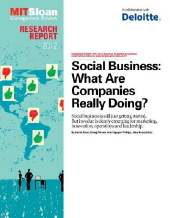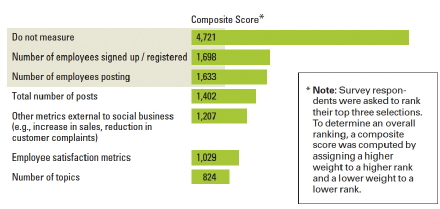Lack of Measurement of Social Business Initiatives a Key Issue
While survey respondents most frequently cite “a clear vision” and “leadership” as critical to adoption of social software, the most common answer to the question “How do you measure social software use?” is Do Not Measure.
Social Business

It’s a disconnect, and it’s significant.
On the one hand, respondents to MIT Sloan Management Review’s recent survey on how companies use social business tools most frequently cite “a clear vision” and “leadership” as critical to adoption of social software.
But on the other hand, the most common answer to the question “How do you measure social software use?” is Do Not Measure.
That suggests that an important resource is missing — measured results on just what, exactly, is going on in companies.
This disconnect on the need for leadership vs. the lack of metrics is one of the key findings of the 2012 Social Business Global Executive Study and Research Project, presented online in a special report on social business. MIT SMR, in collaboration with Deloitte, conducted a survey of nearly 3,500 business executives, managers and analysts from organizations located around the world. The survey captured insights from individuals in 115 countries and 24 industries.

Measuring the Effectiveness of Social Business Initiatives
Figure 11 from part 7 of the 2012 Social Business Global Executive Study and Research Project.
The disconnect between the need for a clear vision and the lack of data to support it can mean that those who wish to step up their leadership in social collaboration don’t have the tools they might normally use to encourage action. Lack of management support is cited most frequently as the biggest barrier to adoption.
As the report states:
Metrics may not be critical when companies are experimenting with using social software, but as social software use becomes more important to an organization, having metrics in place can help managers assess, encourage and reward related behaviors. These metrics may be even more important in organizations that need to shift their cultures to be more compatible with social business.
“Social initiatives within an organization need champions to support and grow these initiatives,” says Gerald Kane, an assistant professor at Boston College.

Comments (2)
What Peter Drucker Would Be Reading | The Drucker Exchange | Daily Blog by The Drucker Institute
kaligrafiindonesia